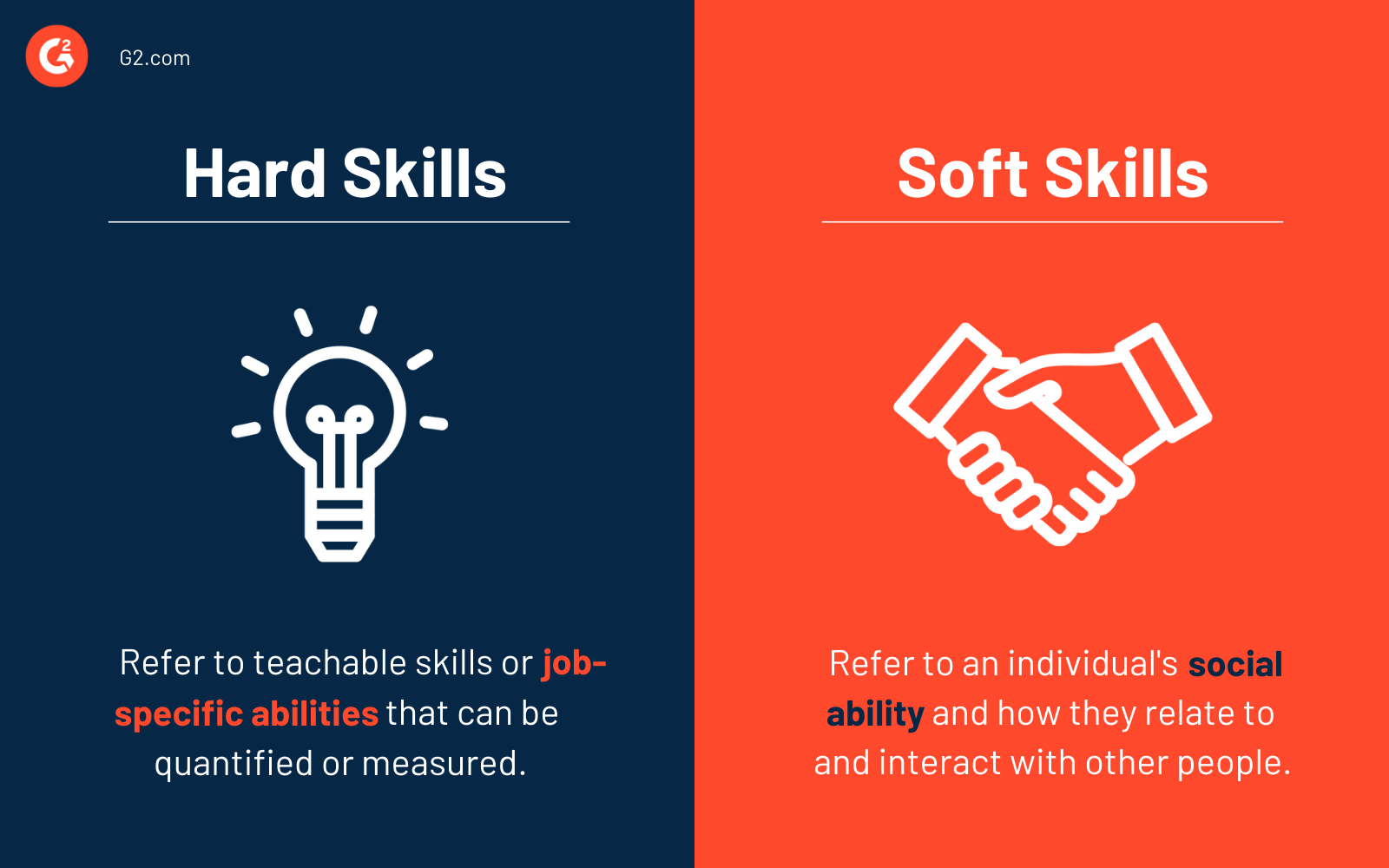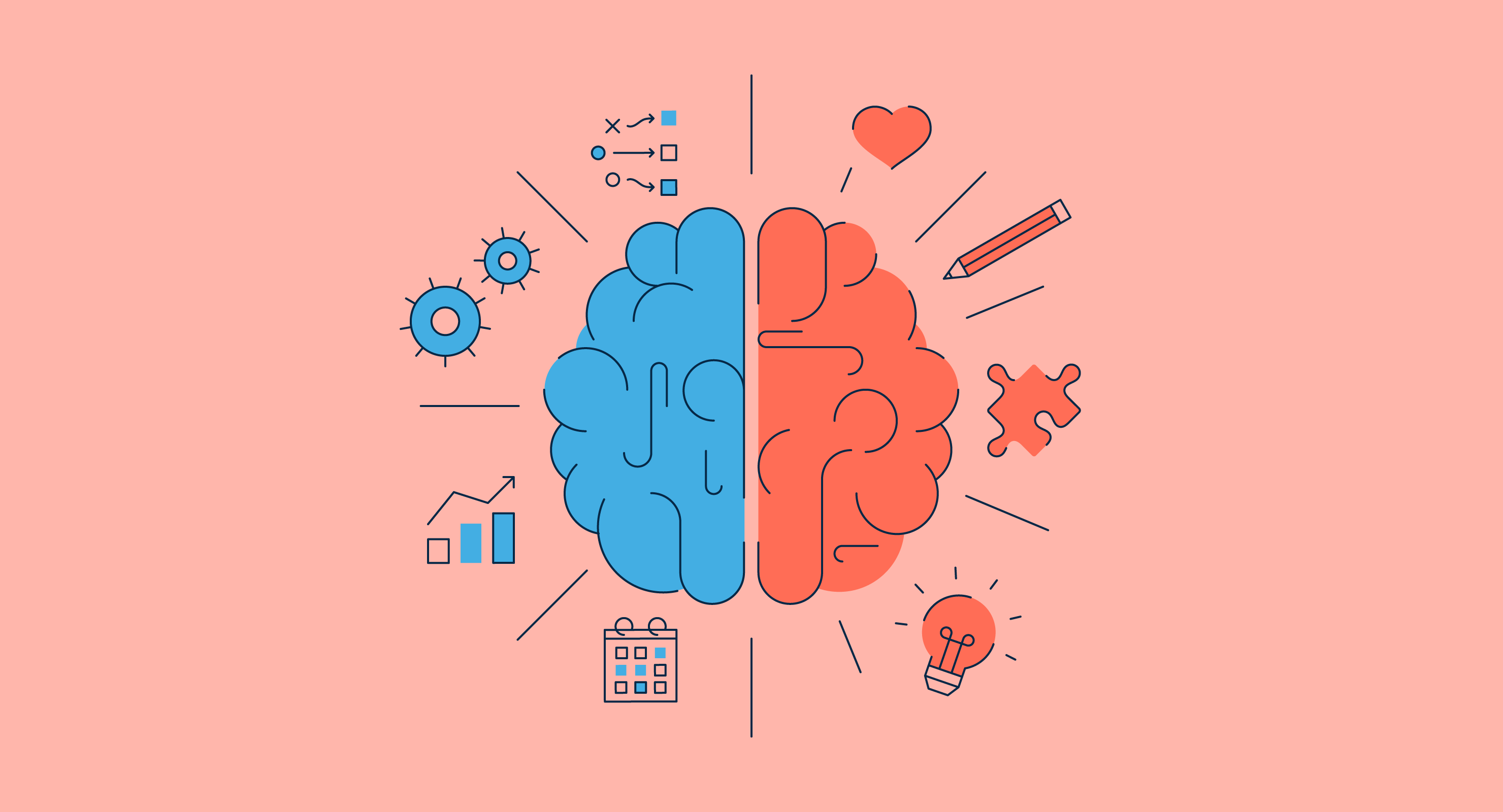Some things in life go together.
Like peanut butter and jelly. A bagel and cream cheese. A cold drink on a hot summer day. And the perfect combination of hard skills and soft skills.
Building a robust skill set consisting of hard skills and soft skills can take an individual’s career and a company as a whole to the next level. Having this unique combination of skills in your arsenal is more complicated than it sounds, but the magic happens when the two come together.

While hard skills are job-specific and are learned through work experience, soft skills refer to someone’s ability to relate and work with others. No matter the role, both are important and can play a big part in how one’s career advances.
What are hard skills?
Hard skills are the technical capabilities an individual has that can be quantified and measured. Typically, these are the skills that a person has acquired through formal schooling, training, or certifications. Hard skills can also be learned through on-the-job training and real-world experiences.
Examples of hard skills are:
- Analytics
- Bookkeeping
- Inventory control
- Being bilingual or multilingual in a foreign language
- Network security
- SEO and SEM
- Copywriting
- Data mining
- Graphic design
- Programming languages (HTML, CSS, Python, Java)
The types of hard skills an individual has depend on the roles they’ve held throughout their career, as they can be trained for and learned on the job. For instance, a graphic designer has hard skills related to color theory and typography, while a nurse has hard skills associated with the medical field, such as drawing blood or taking blood pressure readings.
Essentially, hard skills are the abilities highlighted on an employee’s resume or cover letter for a recruiter or hiring manager to notice. Hard skills may also be listed as “requirements” when writing a job description for an open role at your organization.
How to develop hard skills
Individuals looking to develop hard skills may use technical skills development software for a unique learning experience. Companies in various industries utilize these tools to train employees on new skills with role-based modules that include videos, interactive content, and more.
Outside of these tools, people can take educational courses specializing in a particular skill, get personalized tutoring, or enroll to receive specialized certification. Once a new hard skill is obtained, employees should keep their resume updated to highlight their recent accomplishments.
Whether it’s a free program, a paid course, or even tuning into an instructional video on YouTube, improving these types of skills takes time and practice. Once these skills are learned, be sure to apply it to real-world experiences, like a work project or assignment.
If you’re looking for online course providers, below are the top five leading software solutions from G2’s Summer 2021 Grid® Report:
How to measure hard skills
It’s essential to take time to measure the hard skills in your arsenal, as well as the ones your team possesses. Hard skills are easier to measure than soft skills because they’re qualitative. Assessing these skills can be a simple yes or no question: does an employee have this skill or not?
If the answer is no, then training may be needed to ensure they can develop it if it’s crucial to the daily responsibilities of their role.
People should highlight hard skills on resumes and cover letters when applying for a new role that is skill-specific. And as an employer, taking the time to ensure your team is equipped with the tools they need to consistently learn or refresh their expertise can go a long way in their personal development and help the business grow and scale long-term.
Want to learn more about Technical Skills Development Software? Explore Technical Skills Development products.
What are soft skills?
Soft skills, sometimes called people skills or interpersonal skills, refer to how people collaborate and interact with others. Unlike hard skills, these are more difficult to teach and learn individually but are just as important to master.
Examples of soft skills are:
- Creativity
- Teamwork
- Communication
- Decision-making
- Collaboration
- Problem-solving
- Empathy
- Emotional intelligence
- Dependability
- Critical thinking
Soft skills showcase an individual’s work ethic and ability to collaborate with others. Employees can utilize their soft skills to make a positive impact on their organization and improve company culture.
It’s important to note that some jobs emphasize soft skills over hard skills, especially within people management roles. This is because soft skills are more difficult to acquire, while hard skills can be learned in a class or through an instructional video.
How to develop soft skills
No matter the industry or the size of the organization you work for, it’s always important to develop and improve your soft skills.
Job seekers can highlight the unique soft skills they possess to set them apart from other candidates. Having communication, empathy, and teamwork skills can help you stand out to recruiters.
Employees should work on strengthening communication skills with their coworkers. This will show their manager or team leads that they have the soft skills needed to manage deadlines, be a team player, and work cross-functionally with individuals of all personality types.
As a manager, having the ideal people management skills will set you apart from other leaders. You’ll gain an increased understanding of what motivates your team to succeed while building trust and transparency when your employees need it most. Soft skills can also come in handy when diffusing a conflict or resolving a bottleneck.
Executives within an organization should develop soft skills to better understand their company’s culture. Soft skills can also help executives better communicate with other stakeholders and learn what matters most to their employees.
At the end of the day, you can be an excellent employee, but it won’t count for much if you don’t have the soft skills needed to properly work with others.
Now is the time to get SaaS-y news and entertainment with our 5-minute newsletter, G2 Tea, featuring inspiring leaders, hot takes, and bold predictions. Subscribe below!
How to measure soft skills
As mentioned, measuring soft skills is more complicated than measuring hard skills, but it’s not impossible.
One way to know how your soft skills measure up is to ask for feedback from managers, colleagues, direct reports, or even friends and family. As the people who spend the most time with you, they may provide insights into areas where you excel and what soft skills you need to improve. These individuals can also challenge their employees with various activities that require building their soft skills.
There are also self-assessment tests you can take to analyze your soft skills. Some of these include:
How to blend hard skills and soft skills
Hard skills and soft skills shouldn’t feel like oil and water -- they should come together in the workplace. Regardless of the organization you work for, it’s important not to pit hard skills and soft skills against one another. Instead, emphasize how they can work together to create a positive working environment.
Whether your department provides training modules or attends workshops on team building and collaboration, skills development is all about finding areas to improve upon that inspire growth at an individual and group level.
Remember, hard skills and soft skills are equally important. Some days you walk into work and have to really flex your hard skills, while others may call for an abundance of soft skills. It's important to factor in the fact that many roles need a mix of both to advance further within the corporate ladder.
Regardless of what the day brings, it’s important to have both sets of skills in your arsenal.
The best of both worlds
Successful businesses need employees who know how to flex both soft and hard skills. Finding balance between the two can inspire greater business success for the long term and improve employee relations.
Once you identify the hard and soft skills that matter most to your team, incorporate them into the recruitment process to find the best candidates.

Mara Calvello
Mara Calvello is a Content and Communications Manager at G2. She received her Bachelor of Arts degree from Elmhurst College (now Elmhurst University). Mara writes customer marketing content, while also focusing on social media and communications for G2. She previously wrote content to support our G2 Tea newsletter, as well as categories on artificial intelligence, natural language understanding (NLU), AI code generation, synthetic data, and more. In her spare time, she's out exploring with her rescue dog Zeke or enjoying a good book.

